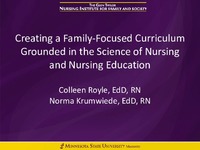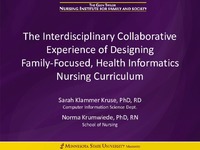| dc.description.abstract | <p>Session presented on Saturday, April 9, 2016:</p>
<p><strong>Introduction:</strong> A nurse educator must draw from the science of the discipline, as well as the science that informs nursing education, to transform nursing practice from an individual to family-focused care (Denham, Eggenberger, Young, Krumwiede, 2016; Institute of Medicine, 2010; Young, 2008). When undergraduate nursing education integrates family-focused nursing practice approaches, nursing students learn to Think Family in all care settings. Research findings suggest this paradigm has potential to improve health outcomes of individuals, families, and communities (Chesla, 2010). Even though evidence supports this approach, few nursing programs have formally incorporated family-focused nursing practice throughout an undergraduate curriculum (Osergaard & Wagner, 2014). Given the significance of family to health in nursing education curricula (Duhamel, Dupuis, & Girard, 2010; Nyriati, Denham, & Ware, 2012) this lack of attention is troubling. Nurse educators have the responsibility to develop significant learning experiences (Fink, 2013) centered on the scientific and praxis research of the nursing discipline that will transform nursing practice with families and society.</p>
<p><strong>Purpose:</strong> Nursing education research and practice inform the teaching/learning practices that nurse educators use while designing courses and curriculum. These curricular decisions shape the future directions of nursing education and have potential to encourage nursing practice to move toward a family and community foci (Denham, Eggenberger, Young, Krumwiede, 2016; Holtslander, Solar, & Smith, 2013; Wright & Leahey, 2013). Nurse educators who value a family-focused curriculum believe that it fosters family-focused nursing once a student enters practice. This School of Nursing developed a Family Nursing Constructs Framework to guide faculty in using family nursing evidence and encourage undergraduate nursing students to care for families and improve the health of society. The aims of this presentation are to: 1) Examine nursing educational research findings that support family-focused nursing education, 2) Analyze processes used to develop and implement a family-focused nursing curriculum, and 3) Share the Family Nursing Constructs Framework with participants.</p>
<p><strong>Methods:</strong> First, research teams conducted extensive literature reviews and research inquiries which illuminated family care scientific foci necessary to transform practice. Several family nursing theories, models, and areas of family nursing research provided the foundation for development of this framework of family constructs. To date more than 30+ constructs have been identified and clarified from family evidence. The Family Nursing Constructs Framework was created as a coherent approach to guide teaching family focused nursing actions in our curriculum. Selecting the word 'construct' for use in this framework was deliberate since the Oxford dictionary definition of construct relates to the action of fitting parts together (Abate, 2002). This framework fits the science of family nursing and practice together. Second, literature was reviewed for themes related to pedagogical approaches for teaching family nursing practice. Intentional learning practices were documented that aimed to increase students' knowledge and skills for nursing practices with families. These learning practices were noted for inclusion in courses. The Family Constructs Framework was then used to examine and revise the curricula in the School of Nursing at Minnesota State University, Mankato. Faculty committed their expertise, energy, and several academic years to developing a curriculum that would use family nursing research and theory to advance family nursing practice. This work was based on the premise that some family nursing knowledge and selected family practices could be appropriately taught in pre-licensure education to improve family health and close the gap between research and practice. Faculty engaged in intensive dialogue about the direction, intent, and strategy of curriculum transformation. A decision was made to concentrate on nursing practice with a focus on family care and family health, rather than traditional medical approaches that emphasize individuals and health conditions or medical diagnoses. Scholarship of ongoing literature reviews and faculty research programs continue to inform the curriculum.</p>
<p><strong>Results:</strong> The curriculum design includes a series of four family focused courses in the nursing major curriculum. The courses were developed with attention to family nursing practice. Using their own research findings, faculty teams of researchers and teaching scholars identified constructs to be addressed in courses. Four broad family construct categories were found to be the core for course development: Family Balance, Family Protection, Family Integrity, and Family Reintegration (Meiers & Brauer, 2008; Meiers, Eggenberger, Krumwiede, 2011; Meiers, Eggenberger, Krumwiede, Bliesmer, & Earle, 2009). Family members create family balance by enacting various roles to balance the health experience. Family balance is addressed in the early course that introduces students to health in families and transitions during family life. The overarching construct in a second course emphasizes acute illness experiences in a family is Family Protection. The family protection construct includes actions and rituals to keep family members safe in situations of illness or threat. Families enact a sense of joining together within a health experience to challenge the illness and to maintain family integrity. Reintegration within families that are managing chronic illnesses and illness experiences involve the family's capacity to adapt to reality and make choices to manage the illness, while continuing to evolve as a developing family. Family Reintegration emerges as a strong construct in the third course that focuses on chronic illness individual and family experiences. A fourth course emphasizes the Family Integrity in families in crisis who are vulnerable. First course: Family and Societal Nursing Inquiry Second course: Nursing Care of Families in Transition I Third course: Nursing Care of Families in Transition II Fourth course: Nursing Care of Families in Crisis Faculty members within the Nursing School view family as context, family as client, family as unit of care, and family as element of society, simultaneously. The teaching-learning practices that were used in each of the series of four courses prepare students to simultaneously care for ill and well individuals and their families within the society and community. Nursing education research that would support teaching these constructs were identified and reviewed by teams of teaching scholars (Bevis & Watson, 2000; Ironside, 2001; Benner, 1984; Eggenberger & Regan, 2010; Eggenberger, Krumwiede, & Young, 2015; Khalaila, 2014 ). One of the more significant results is that simulations were shifted to move beyond technical skills to include teaching family assessment, interaction, and decision-making skills. The Minnesota State University Mankato web site (http://mavtube.mnsu.edu/academics/taylor_institute.html?id=0_ks3ipdjn) includes videos focused on family constructs, family skills, and innovations related to technology and family education. The experiences of this faculty team suggest that focusing on family nursing throughout an undergraduate nursing education is appropriate, feasible, and crucial for advancing family nursing practice. Innovative teaching tools such as video clips that address family nursing competencies and family nursing care have been created to help students envision and reflect on the type of practice that meets the needs of families. Students internalize the beliefs that nursing happens when there is a relationship and an understanding of the human health experience. Creating a framework of family constructs based on the science of nursing enabled students and faculty to have meaningful dialogue. The results are that we have moved family front and center to practice, we have developed a framework that informs nursing actions, and we aligned practice to theory and research in an effort to reframe student thinking.</p>
<p><strong>Conclusions:</strong> This evolving curriculum uses family constructs and learner-centered pedagogies as an organizing curricular framework, and uses family competencies as a target for focus in developing family care skills and theory in clinical learning experiences. This framework links research, education and practice in an undergraduate nursing curriculum. Nurses who have been educated in this academic setting appear to view family health as a concern, whether the family is in the context of the individual family member or the family unit is the priority. Family Nursing Construct Framework has successfully been used to establish a scientific basis for an undergraduate nursing education curriculum and translation into nursing practice. Family Nursing Constructs engage undergraduate nursing students to Think Family as they provide care for individuals, families, and communities. Faculty continue to focus research on family nursing constructs, best practices in teaching the constructs, and ways to develop and evaluate student thinking with family practice.</p> | en |






